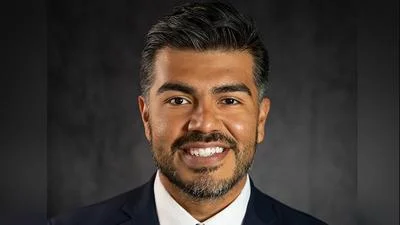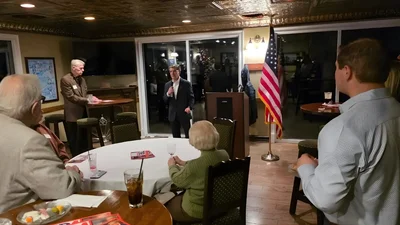Illinois Restaurant Association President and CEO Sam Toia said more than 321,000 employees were laid off or furloughed in the restaurant industry at the peak of the pandemic. | Pixabay
Illinois Restaurant Association President and CEO Sam Toia said more than 321,000 employees were laid off or furloughed in the restaurant industry at the peak of the pandemic. | Pixabay
The last year has been a long, dark journey for the restaurant industry with unexpected twists and turns around every corner.
Illinois Restaurant Association President and CEO Sam Toia said he now sees a bright future after a very difficult time as the COVID-19 pandemic struck and restrictions were imposed upon restaurants, he told Prairie State Wire.
“This was unbelievable,” Toia said. “This is the worst tragedy to happen to the hospitality industry in my lifetime. No one saw it coming. Nobody thought we’d still be talking about this 13, 14 months later.”

Sam Toia
| Illinois Restaurant Association
Before the pandemic, more than 250,000 eating and dining establishments operated in Illinois. The National Restaurant Association estimates 20% of such businesses will be forced to close, meaning 5,000 will be lost in the state. In the end, thousands of jobs may be lost as well.
“We were, and I said were, past tense, the largest private sector employer, doing over $30.1 billion in sales,” Toia said. “At the peak of the pandemic, out of the 594,000 people that were working in the food service restaurant industry, over 321,000 employees were laid off or furloughed. So it's been very rough out here, very, very rough. That's why we're so glad that the federal government stepped up with this second round of PPP and then also within the stimulus bill.”
The Illinois Restaurant Association created an employee relief fund through its Illinois Restaurant Association and Foundation Employment Relief Fund.
“We've raised over $300,000 and we've given $500 grants to people that work in the industry from the busboys to the dishwasher to wait people to the food runners,” he said. “So we've been trying to support all our team members.
Toia said while restaurants are known as places that serve food and drink, they rely on human interaction to thrive. That’s why the industry wants to support those who have lost jobs or were forced to take reduced hours.
“You know, people who worked in the restaurant industry, restaurant owners, operators are very giving. You're only as good as the people that work for you,” he said. “People come to the restaurant for food, that they come back for the service. So any restaurant owner-operator knows he has got to take care of their team members as team members are the ones that bring the customers to dine in the restaurants.
“So it's been really rough on not just the restaurant owners operators, but also all the team members that work in the restaurants,” Toia said. “So it's been really hard on the hospitality industry. We were one of the first industries to be closed down and we would be one of the last industry to fully, you know, reopen.”
Important lessons can be learned, he said, and restaurants must be prepared. Scientists and public health experts must be listened to and followed.
“We never saw a pandemic coming down the pipe like this,” Toia said. “We have to make sure we’re ready. They say we could see another one of these within the next 10 years. So obviously, we will make sure that we're ready. We're a highly regulated industry. We visited a couple of times a year by the health department, by the building department. We know how to do this right.”
He said restaurants will continue to focus on cleanliness and sanitation, with employees masked and social distancing in place. A renewed effort is in place to educate staffers on food handling, and his association will play a major role in that.
While restaurants are eager to resume normal levels of business, so are their customers, Toia said.
“Absolutely. They want to eat. They want an experience,” he said. “You know, they want to feel welcome. This is part of their makeup, you know, it's all about the experience. You know, people go in, they want to have a good time.
“People go in for the food, but they come back for the service,” Toia said. “You know, they want the great experience they have when they visit a restaurant here in the state of Illinois. I think that people really value these, they want to support them and they don't want to see them lost.”
He said restaurant owners realize people are hungry to return to their disrupted lives, and that includes going out for a meal, a drink and a good time.
“It’s been a mess but in life you always want to move forward. It's definitely a challenge for places, you know, to operate under that,” Toia said. “No restaurant owner-operator ever put their business model together with 50 or 60% of capacity. However, with the second round of PPP and the president just signing last month the new stimulus bill, which has the restaurant, the Restaurant Revitalization Fund as part of it, which was put on the side of $28.6 billion fund that can go to independent restaurants throughout the country, we feel that that is very good for independent restaurants. We worked on that very hard with the National Restaurant Association.”
Biden said America should target July 4 for a restoration of normal affairs.
“Well, we're hoping. That would be great. So, you know, we will see,” Toia said. “We see that there was a step backwards in the last few days with the J&J (Johnson and Johnson) vaccine that they had to pull that back. So I don't know if that's going to affect everyone that wants the vaccine throughout the country having one by July 4. It would be great to see July Fourth of 2021 back to normalcy, but if it's Sept. 1, it will be Sept. 1.”
He said the onset of warmer weather, allowing for more outdoors dining, will be good for restaurants as well. Things are looking much brighter than they did 90 days ago, Toia said.
He has been vaccinated, as have some members of his team.
“As a matter of fact, we were doing a vaccine clinic for hospitality workers this past week. We had to postpone it,” Toia said. “We've been in contact with the Department of Public Health. We hope that vaccines are there, and we hope to have our hospitality program for workers who want to get the vaccine next week.”
Toia literally grew up in restaurants. It was a family business in which he flourished, opening 13 Leona’s Restaurants and two Hop Haus Sports Pubs in Chicagoland.
Toia has led the Illinois Restaurant Association, a nonprofit trade association representing the state’s largest private sector employer, since 2012. He was the IRA’s board chairman before being named president and CEO.
On Dec. 11, he participated in a virtual town hall meeting organized by Sen. Tammy Duckworth (D-IL). IRA Board Chairman and Burrito Beach CEO Greg Schulson, Frontera Restaurant group owner Rick Bayless, Samco Enterprises CEO Sam Sanchez, Obed & Isaacs owner Karen Conn and Virtue Owner and executive chef Erick Williams also took part in the discussion.
“Restaurants are more than just a place to eat, they’re the glue that holds communities together,” Duckworth said. “For every restaurant that closes, every job that’s lost, our communities suffer. As the pandemic continues to surge throughout the winter, we know that business can’t just go on as usual and we need to bring federal aid to the restaurant industry as soon as possible.”
She co-sponsored the RESTAURANTS Act, legislation that called for the creation of a $120 billion restaurant revitalization fund to provide financial assistance to restaurants and bars that have been affected by the economic impact of COVID-19.
It was pared down, with $28.6 billion for restaurants finally included in the $1.9 trillion COVID-19 relief package approved by Congress and signed into law by President Biden in March.
In an end-of-the-year message to IRA members, Toia said 2020 was “the most challenging year we have ever faced as an industry.”
But he said it was met with a determination to survive and, in the end, move forward.
“We have seen unparalleled levels of engagement from restaurants that have made their collective voices heard at the local, state, and federal levels,” Toia wrote. “Restaurants have stepped up to lend a helping hand to those in need like never before. Operators have pivoted their business models, and gone to incredible lengths to keep their team members and customers safe. Illinois’ food service community has proven its resiliency and solidarity again and again.”
Toia, 57, enjoyed restaurants two to three times a week and looks forward to resuming that dining schedule. He enjoys sampling the many options available in Chicagoland, but doesn’t have one special place, he told Prairie State Wire.
“Oh, I can't say. They’re all my favorite,” Toia said. “So it's like asking a parent to pick out their favorite child.”






 Alerts Sign-up
Alerts Sign-up